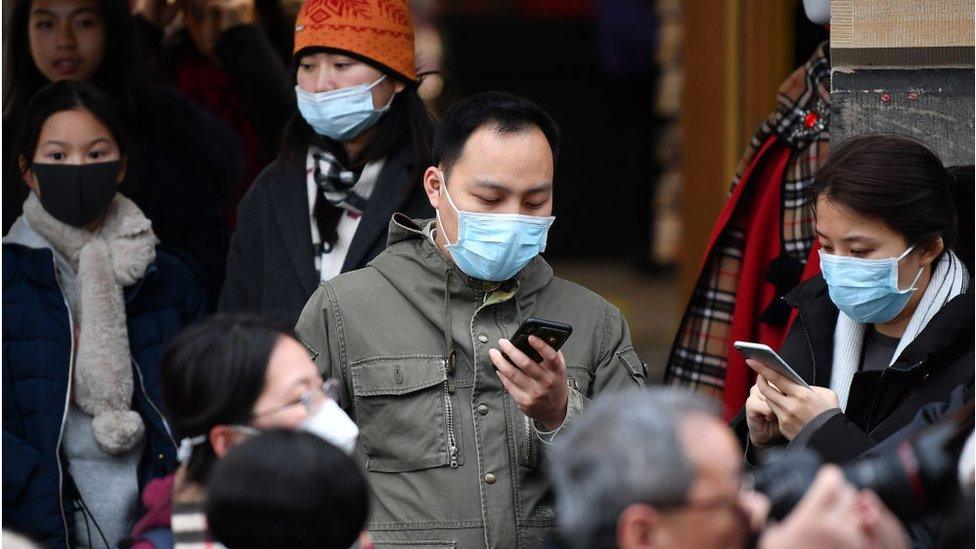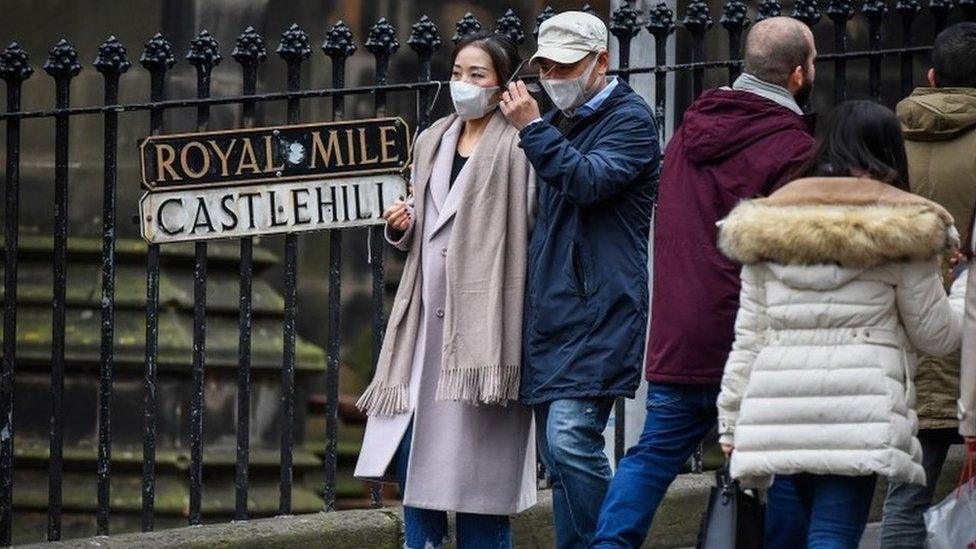Coronavirus: Case 'highly likely' to be found in Scotland in coming days
- Published

A case of coronavirus is "highly likely" to be detected in Scotland in the coming days, the country's chief medical officer has said.
Dr Catherine Calderwood said an emergency resilience operation had been activated and that the country was "well prepared" for an outbreak.
So far 7,700 cases of the virus have been confirmed in China, with the death toll standing at 170.
In Scotland, 16 patients have been tested, external for the virus.
Each of these cases has come back negative.
Dr Calderwood said the public should be reassured that health and infectious disease experts were "working round the clock".
She said: "It is highly likely we'll have a positive case of coronavirus in Scotland in the coming days.
"The public can be assured that Scotland has well-established plans and is well prepared for these types of outbreak."
The chief medical officer added: "We have a proven track record of dealing with challenging health issues and have established public health and infectious disease experts working round the clock.
"We have also activated our emergency resilience operation."
Scottish labs to test for virus
Scottish laboratories will be able to start testing for the Wuhan strain of the virus in the coming weeks.
Currently, samples taken from suspected cases in Scotland have to be sent to a Public Health England lab in London.
Once the tests are received there, it can take between 24 and 48 hours for a result to be known.
Epidemic v pandemic: What's the difference?
The majority of those in Scotland tested for the coronavirus have been well enough to isolate themselves at home while awaiting their results, but some were admitted to hospital.
It is understood virology testing centres in Glasgow and Edinburgh will be given testing capability first, followed by labs in Aberdeen and Dundee. Inverness will also have some ability.
Health officials warn travellers returning to Scotland from Wuhan, external to avoid contact with others for two weeks, even if they have no symptoms.
This is because the incubation period for the virus is believed to be between one and 14 days. Experts believe it is infectious during the time - before symptoms show.
Those who develop symptoms within two weeks of travel to Wuhan are being urged to contact NHS24 on 111, external.
What are the symptoms?
Coronaviruses are common, and typically cause mild respiratory conditions, such as a cough or runny nose.
But some are more serious - such as deadly Sars (Severe Acute Respiratory Syndrome) and Mers (Middle East Respiratory Syndrome).
This outbreak - known as novel coronavirus (nCoV), external - is a new strain that has not been previously identified in humans.

It seems to start with a fever, followed by a dry cough and then, after a week, leads to shortness of breath.
But in more severe cases, infection can cause pneumonia, severe acute respiratory syndrome, kidney failure and even death.
Most of those who died have been elderly people, suffering from other chronic diseases including Parkinson's and diabetes.
Is Scotland prepared for an outbreak?
A plan is in place for dealing with a confirmed case, as is usual for any virus outbreak.
Patients with the virus will be isolated.
Depending on how unwell they are, they could be told to stay at home and avoid contact with others.
A Scottish government spokesman said: "Self-isolation of people returning from an affected area is entirely standard practice in a virus outbreak such as this and follows the same well-established health protection procedures in place elsewhere in the UK and in other European countries.
"It is proven to be effective in reducing the risk of any infection a patient may be carrying passing to others. The NHS is well prepared and has a proven track record of dealing with these types of outbreak."
Those who need hospital treatment will be isolated.
This could mean putting them in a single-bed room, rather than on a ward shared with other patients.
Hospital staff can protect themselves by wearing simple protective equipment like gloves, masks and aprons.
If more serious precautions are required, patients could be sent to an infectious diseases unit.
Scotland has them in Edinburgh, Glasgow, Aberdeen and Lanarkshire.
If the outbreak is deemed a high consequence infectious disease, external - as other strains of coronavirus Sars and Mers were - then the patient could be transferred to a specialist facility outside Scotland.
UK case 'likely to come from someone already here'
Prof Yvonne Doyle, of Public Health England, said the first UK case is likely to come from someone already in the country.
As of Thursday, 161 tests had been carried out, external on people across the UK - all with negative results.
The UK government said the risk to the population remains low.

Learn more about the new virus

The story explained: How worried should we be?
Wuhan profiled: The city now in lockdown
In detail: Follow all our coverage here
Have you been affected by any of the issues raised? You can share your experience by emailing haveyoursay@bbc.co.uk, external.
Please include a contact number if you are willing to speak to a BBC journalist. You can also contact us in the following ways:
WhatsApp: +44 7756 165803, external
Send pictures/video to yourpics@bbc.co.uk, external
Tweet: @BBC_HaveYourSay, external
Please read our terms & conditions and privacy policy
- Published27 January 2020
